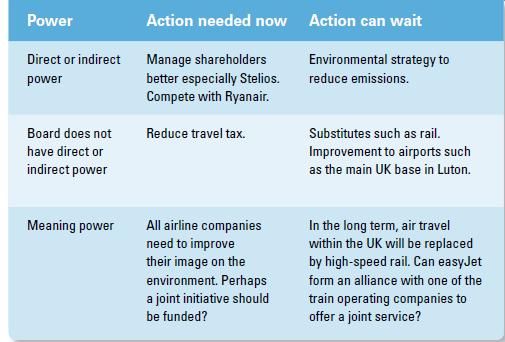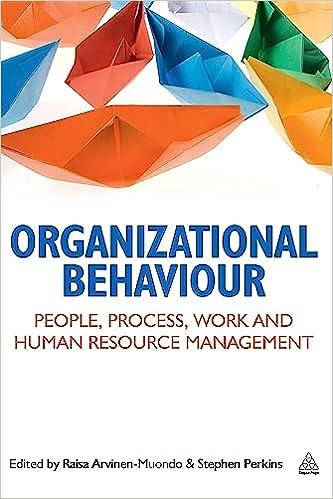EasyJet is a successful budget airline. Its main shareholder is its founder, Sir Stelios Haji-Ioannou (Stelios). The
Question:
EasyJet is a successful budget airline. Its main shareholder is its founder, Sir Stelios Haji-Ioannou (Stelios). The European budget airline sector is highly competitive where the market leader, Irish-based Ryanair, consistently delivers lower-cost flights. Actual or potential conflict exists at several levels. There is competition between the various actors, which includes competition between: individual airlines; between airports competing to attract airlines; between airlines and substitutes, such as rail for short-distance travel, London to Paris, for example. EasyJet needs to improve its main UK airport, Luton, which is owned by the local council although managed by an operating company. There are also disagreements with pressure groups for environmental change and with government ministers whose decisions on the taxation of passengers or the location of airfields or rail links can either help or hinder the aviation sector. There is also, in Marxist terms, a current crisis of global capitalism – until quite recently there were opponents in tents in the City of London. Carolyn McCall OBE, easyJet’s CEO, decides to discuss the issues with her HR director. That easyJet is of professional interest to HR managers can be shown in recent articles in the Human Resources Management Journal.
What are the main issues from the case in terms of power, politics and conflict? What practical advice can the various theories offer her? Her first task is to decide what is outside the influence of her board or is irrelevant to the business. Her second task is to consider where cooperation with rivals may offer a better chance of success as opposed to conflict. This leaves strategic issues that are urgent and important. These are 1) reduce the tax on air travel; 2) improve the links to substitutes such as rail; 3) compete with Ryanair; 4) manage the shareholders, especially the founder Stelios. What do you think should be done? What games are being played? What sources of power are available to the board? What are the conflict handling styles of the actors? And what help does evolutionary theory and game theory offer? Firstly most of the important issues are outside the control of the board. Other issues are not so urgent and are also outside the control of the board. This leaves issues that the board can influence and that are important as well as those over which it has no direct power. This political strategy analysis is shown below.
In most cases the board lacks power and so will have to negotiate. The nature of the game is also important. Games are both open and closed. Airlines can attract as many passengers as the market will bear so the market here is open. However, airlines are limited in terms of landing rights at airports so here the market is closed. The case will be used to assess the likely future actions of the top team as well as future issues.
Finally, Carolyn needs to maintain the confidence of the board in her ability to deliver shareholder value. Here the conflict with the main shareholder is critical. Where possible she should seek to collaborate but she should not avoid conflict if the strategy is correct – such as the current plans to expand the company’s operations to new areas. The make-up of the board is critical here.
What actual advice should be offered? The board faces a series of dilemmas and raising them publicly will not help solve them. So the problem of a difficult shareholder who disagrees with strategy may best be left to other shareholders to manage. PR to assist the image of aviation will help all the players so here a cooperative strategy is the best option – especially when looking at overall transport policy with the government. At the level of the actual workforce the firm seems to be doing well, although as they expand and take on more non-UK staff clear communication is important.
Discussion questions
● Using the model of conflict in the text where do you see the organization is on the dimension of conflict?
● What type of games are being played – open or closed?
● What power does the board have over the strategic issues raised in the case?
● What should the board members do next?
● What issues does the case and the in-class discussion raise for you and your own organization?
● What are the implications for HRM?
Step by Step Answer:

Organizational Behaviour People Process Work And Human Resource Management
ISBN: 9780749463601
1st Edition
Authors: Stephen J Perkins, Raisa Arvinen-Muondo





